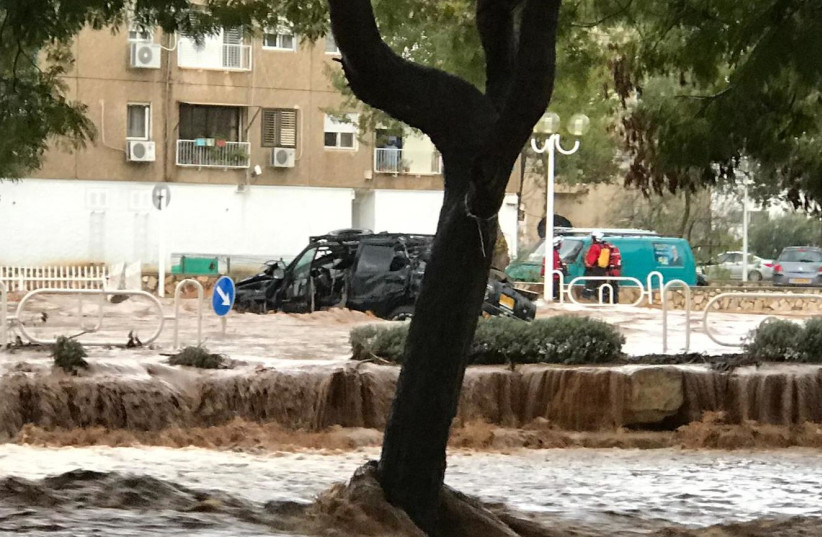The Israel Police issued weather and flood warnings for southern and central Israel on Thursday due to the severe winter storms rocking the country.
The police announced that from the evening hours of Thursday, February 1, until Saturday, February 3, there is a chance of flooding on the coastal plain, as well as early Friday morning chances of flooding in the Dead Sea and the Judean Desert area. Flooding is also expected later in the day in the central Negev and the Arava.
The winter weather is expected to begin in the afternoon, accompanied by storms and floods.
The police also announced that they would be posted along the country's roads and at the main crossroads with the aim of safeguarding the lives and safety of all Israeli citizens.
The police's rescue units and aerial units will be active at the various locations as needed.

The public is advised to avoid going to the listed areas and pay attention to the police updates.
Police will keep posting updates throughout the day about roadblocks and traffic disruptions due to the weather.
It is possible to receive updates from the Israel Police through the number 110 and a chatbot, as well as through the Telegram channel of the Traffic Division.
However, in an emergency, don't hesitate to call the police at the normal emergency number, 100.
The police call on the general public to drive very carefully and not to approach flood zones and water reservoirs that are not regulated due to the existing dangers of falling, drifting, and drowning.
Police instructions for the public
Below are instructions from the police for the public about the proper conduct in rainy weather:
- It is not recommended to take non-essential trips or trips to streams and areas that may be flooded due to the stormy weather.
- Avoid entering parking lots and underground levels during significant rain events. Do not enter elevators on underground levels, and do not stay in parking lots.
- Bathing in the sea during strong winds and high waves is dangerous and there is a risk of drowning, therefore you should avoid bathing and spending time on the beaches.
- Strong winds can lead to the collapse of trees, poles, etc., as well as the flying of various objects. Any hazard of this kind must be reported to the authorities as soon as possible, as well as tying/securing on balconies and gardens dangerous objects that may fly as a result of the winds and lead to injury to passers-by.
- It is recommended to contact the authorities before going on a trip in order to obtain essential and up-to-date information.
- It is forbidden to cross flooded roads and water channels, puddles, and cisterns by any means of transport and not to approach them. This is life-threatening.
- Travelers are asked to avoid traveling to life-threatening areas.
For drivers and other road users:
- Adjust your driving speed to the road conditions and slow down significantly when entering curves and making sharp turns.
- High beams must be turned on during the entire trip and drive slowly and carefully, especially when there is a cold road due to the risk of slipping.
- When the road is wet, the braking distance is increased. Therefore, it is necessary to keep a greater distance from the vehicle in front.
- The steering wheel must be gripped with both hands, since entering a puddle with the vehicle, and potholes hidden by the accumulation of water on the road - may cause the vehicle to swerve suddenly.
- One must concentrate on driving and avoid distractions with an emphasis on using the mobile phone.
- Avoid entering puddles whose depth cannot be estimated, and be careful of other hazards on the road.
- Avoid crossing water sources and places with strong water flow.
- Pay attention to pedestrians - during rainy weather, it is more difficult to notice pedestrians and break in time if necessary. Slow down in residential areas and give pedestrians the right of way.
- Before entering the car: it is mandatory to check that the vehicle's tires are in good condition and at the required air pressure. Check that the wipers are in good condition and not damaged. Care must be taken to clean the car's windshields in order to provide good visibility to the driver, as well as to clean the front and rear lights of the car - in order to see and show accordingly.
The police chatbot updates: https://go.gov.il/110
